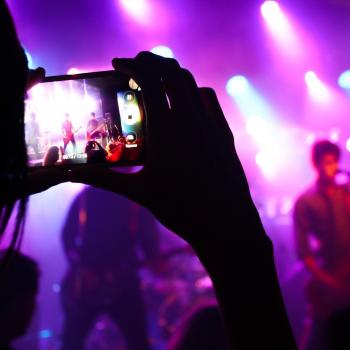What role did race play in the Christian Patriarchy/Quiverfull community in which you grew up? Were there any black or hispanic families? Were they treated differently?
Joe:
In the church I grew up in, there was never a non-white member – ever. The church was not overtly racist, though they had issues with illegal immigration, but the services were very boring and would not have fit into a culture different from a bunch of white dudes and one off key old lady singing How Great Thou Art from a hymnal, accompanied by a piano, then sitting through a two hour sermon that sounded the same every Sunday. But I attended a public grade school and high school where it was proudly noted that we had over 57 different nationalities represented. My best friends throughout my school years were all African America, Asian, and American Indian.
The homeschooling community was extremely white, but we did know several black and Hispanic homeschooling families, with varying levels of involvement in CP/Q. I don’t remember noticing any racism at the time. The cold-shoulder treatment seemed to be saved for families that were not fully committed to homeschooling, regardless of race.
The families we associated with were all white. I honestly can’t think of any minority Christian Patriarchy/Quiverfull families – or even any minority families in our homeschool groups (which included ordinary conservative Christian families in addition to those who followed the teachings of Christian Patriarchy/Quiverfull). That said, my parents were emphatically anti-racist, and if a black Christian Patriarchy/Quiverfull family had come into our community I don’t think it would have been a problem for them at all.
Lisa:
While my parents said that all human beings were perfectly made by God and equal, my Dad didn’t like us mixing with the black families. There were two families we had closer contact with, and my parents were very friendly, but we weren’t allowed to play with them. I think that was because my Dad didn’t want us to consider one of them as a possible spouse. He was against interracial marriage. I remember a nice lady who was married to a Mexican, she was treated differently, as were their son. Not that anybody said anything, but she was never invited and people avoided talking to her too much.
Where we lived in CA was a very rural area, so there were mostly white, blue-collar folks in our homeschool group. There were a lot of Hispanics in our church, but we were the only homeschoolers.
When we moved to VA, there was a lot more diversity in the homeschooling community, but those adhering to the ideas of the Quiverfull movement were primarily white and upper-middle class. People didn’t treat each other differently and race was pretty much irrelevant.
I do not remember knowing anyone who was black. I met a few mixed white/Hispanic families in the community. I don’t think race was a huge issue in my family in particular, my dad had attended many black gospel churches as a child, and had a sort of nostalgic affection for black spirituality. We were around people in the homeschool movement who felt that the confederacy should have won the civil war and that the loss of that war had led to a major downslide in Christianity in America. I was never 100% clear on what my parents’ position was in that regard.
I had no racially diverse acquaintances in my childhood, but to be fair, I didn’t really have many acquaintances at all. For a brief time I was friends with a Hispanic girl down the street, but I wasn’t allowed to go to her house, so she soon got bored of me. My dad went to an African American Baptist church in Chicago when he was a kid, and he always spoke fondly of his memories there. We never really discussed race, but I remember my dad telling me that interracial marriage was not a sin. It wasn’t until my late teens that I had any interaction with people outside my race or religion. It took me a long time to learn how to interact comfortably with diverse groups of people. I’ve always felt that that was one of the major flaws in my upbringing.
My church was solidly multiracial. Black families were not treated any differently from white families, as far as I could tell. The church did fetishize the Spanish language and would commonly ask Hispanic men to sing praise songs in Spanish before the service. We also attracted a Korean mother and daughter. The main difference between white and nonwhite believers in my church was homeschooling. Racial minorities did not homeschool, probably for economic reasons. My church regarded racial diversity as a positive sign that God’s Word was universal, but maintained a strict policy against interracial marriage.
Tricia:
White, middle class Protestants were we all. It was a very segregated world. I never even had a black or Hispanic friend growing up, and there were no opportunities to cultivate such a friendship. I definitely feel like I missed out in that regard. Exposure to other groups and cultures can be so enriching, and I had very little of that. The church I attend now is racially and culturally diverse, and coincidentally so is the neighborhood I currently live in, and this exposure to a wider world has been like a breath of fresh air, even though I can have a difficult time connecting– mostly because I don’t know how. It’s getting easier with time, though.
<<< Previous Question ———————————— Next Question >>>














